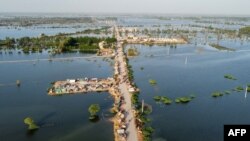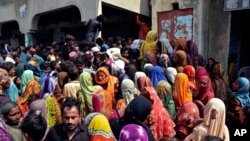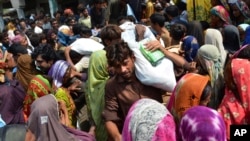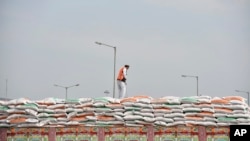The World Food Program warns the catastrophic floods in Pakistan are exacerbating the food crisis in neighboring Afghanistan, where nearly half the population - is facing acute hunger.
The U.N. agency has provided more than 16 million people in Afghanistan with emergency food assistance this year. Much of that aid travels by road through Pakistan.
WFP country director for Pakistan, Chris Kaye, says his agency has procured more than 320,000 metric tons of food in the past year to support operations in Afghanistan.
“The floods in Pakistan are going to put a huge dent in that capability and a great, greater reliance on imported food and commodities. So, we are becoming very, very concerned about the overall food security, not only in Pakistan in the immediate and medium term but also what it is going to imply for the operations in Afghanistan,” he said.
Several provinces in Afghanistan also have been hit by heavy rains and severe flooding in recent weeks. The United Nations reports thousands of homes and large areas of farmland have been destroyed. The Taliban say more than 180 people have been killed.
Kaye says Pakistan provides a vital supply route into Afghanistan. Speaking from Dubai, home to the largest international aid hub in the world, the WFP official says large amounts of food enter Pakistan via the port of Karachi, eventually crossing the border into Afghanistan.
“With the challenges we have now with roads that have been washed away, that presents us with a major logistical challenge and problem. The second element on this one is the fact that the flooded area, of course is an area where the wheat harvest has been stored and a large proportion of that wheat has been washed away,” he said.
Kaye says climate change is having a devastating impact on the whole region and on food security. Before torrential rains inundated large parts of Pakistan, he notes 43% of the population was critically short of food. He says he expects the number of acutely hungry people to increase because of the current crisis. He adds a similar scenario is playing out in Afghanistan.







